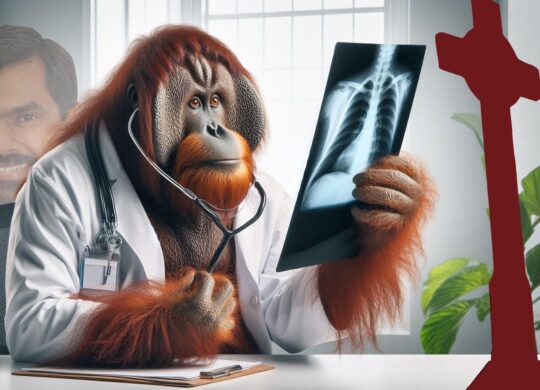Treat?

An orangutan named Rakus had a tough time in 2022. So claimed reserarchers from Germany and Indonesia, in “Active Self Treatment of a Facial Wound with a Biologically Active Plant by a Male Sumatran Orangutan,” published in Nature: Scientific Reports, recently.
Two of these primates, both male, had a fight in the treetops of a rainforest in Sumatra, Indonesia. Rakus, one of the belligerents, was spotted the next day sporting a pink wound below his right eyelid, with a 2-inch diameter chunk of flesh missing. And he had another wound inside his mouth, too.
The researchers followed the animal and saw something surprising. Rakus was observed repeatedly chewing on the leaves of a particular liana plant (not a typical food for orangutans, but known to us as containing an anesthetic) over several days and applying a paste of the leaves to his face. No animal until then has ever been seen to be applying medication to a wound!
Declared the authors:
This possibly innovative behavior presents the frst systematically documented case of active wound treatment with a plant species know to contain biologically active substances by a wild animal and provides new insights into the origins of human wound care.”
Rakus’ wound never became infected. It was healed in a week.
Reported NBC:
The discovery is new evidence that orangutans are able to identify and use pain-relieving plants. A growing body of research suggests other animal species also self-medicate, with varying levels of sophistication. The researchers behind the study think that great apes’ ability to identify medicines and treat wounds could trace back to a shared ancestor with humans.”
Another scientist theorized that ancient humans derived the ability to identify medicinal plants and substances from close observations of animals. We learnt it from the orangutans!
Isabelle Laumer, a primatologist and cognitive biologist, and lead author:
It’s possible that our last common ancestor already showed similar forms of ointment behavior which we adopted.”
“Ointment behavior.” I like that. For a guy who deals in creams and ointments for skin maladies, I thought that was quite clever.
But self-medication won’t work for the greatest affliction of them all: sinfulness. And that affects all humans. And that means all are “dead”:
And while you were dead in your transgressions and sins, in which you formerly walked …,
we all also formerly lived in the lusts of our flesh,
performing the desires of the flesh and of the mind,
and [we] were by nature children of wrath.
Ephesians 2:1–3
Born dead—separated from God, the only source of life. Sinners. And that by nature. Deserving only of divine wrath. What a hopeless predicament.
No self-medication was going to help. How were those who are sinners by nature going to extricate themselves from this horrible eternal mess?
So God decided to take action—divine medication.
God became man, the Lord Jesus Christ, and paid the price of our sins, on the cross, rising on the third day. And for all who have faith in the work of Christ, salvation is given, free, finally, and forever!
God, being rich in mercy, because of His great love with which He loved us,
even while we were dead in transgressions, co-enlivened [us with] Christ—
by grace you have been saved. …
By grace you have been saved through faith; and this not of yourselves, [but] the gift of God.
Ephesians 2:4–5, 8
God’s medicine: grace in Christ. We swallow it: faith. We get cured: saved. It’s all the gift of God. Nope, self-medication won’t do it. Ever.
SOURCE: NBC; Nature; BoingBoing











 Abe Kuruvilla is the Carl E. Bates Professor of Christian Preaching at The Southern Baptist Theological Seminary (Louisville, KY), and a dermatologist in private practice. His passion is to explore, explain, and exemplify preaching.
Abe Kuruvilla is the Carl E. Bates Professor of Christian Preaching at The Southern Baptist Theological Seminary (Louisville, KY), and a dermatologist in private practice. His passion is to explore, explain, and exemplify preaching.